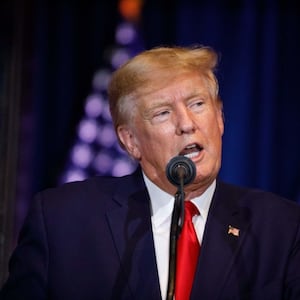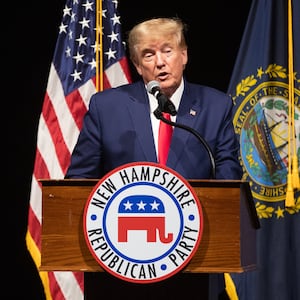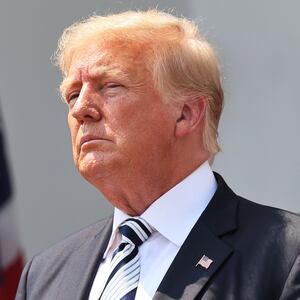Instead of packing arenas and touring the nation to remind everyone who’s king of the Republican Party, Donald Trump is trying something he never really attempted during his previous campaigns: retail politics.
Goofy trips to local restaurants and long lines for selfies have never been Trump’s forte, with the former president almost always opting for the packed arena and a quick plane departure rather than working a living room circuit and pressing the flesh.
So it was notable over the weekend when Trump, whose campaign has appeared asleep for months, awoke with a pair of private events in New Hampshire and South Carolina capped off with a visit to a local ice cream and burger joint, where Trump was seen clasping hands with an employee and praying.
It could be a concerted effort to soften Trump’s image—to bring him out of his shell as a billionaire former president holed up in his oceanside Mar-a-Lago resort. But it could also be something quite different—a charm offensive campaign of necessity that’s literally doomed.
“Let’s not fall for the political spin: the Trump campaign saying he’ll do more retail-style events, they’re simply saying that because they know he can’t pull the crowds he used to,” Alyssa Farah-Griffin, Trump’s former White House communications director, told The Daily Beast.
“This is not some grand strategy of, like, if he shakes enough hands and kisses enough babies, it's gonna turn the tide for him.”
Trump is no stranger to self-reinvention, but paltry fundraising numbers and a questionable demand for his vintage MAGA rallies have left him in a bind.
Trump needs to shore up support among early primary state movers and shakers who are beyond ready to weigh other options while also not falling too far beneath his own self-regard as a former president. The solution, for now, is something like what the Trump campaign came up with last weekend: a pair of private events that can generate some headlines and please the party brass.
The result, however, was just a toned-down version of the rally without the rally, and then a plane ride with reporters from New Hampshire to South Carolina, where Trump did some local media interviews.
Trump’s version of retail politics isn’t exactly a natural fit, for a former president with a Secret Service detail, a persona as a rarefied businessman, and a suit and tie that seem surgically attached to his body when he’s not on a golf course.
Rather than a truly new Trump, voters just got a slightly less angry Trump—who still proclaimed he’s “more angry now” than he ever was.
Representatives for the Trump campaign did not return a request for comment, but a source who speaks with Trump said he’s been boasting that the rallies will return and be “way bigger than they have ever been.”
It remains unclear how or when that would happen.
But Trump won’t have an easy time doing small-scale, intimate events because of his Secret Service detail and the general fanfare that follows him wherever he goes. (Trump has a caravan of merchandise salesmen and other attention seekers who chase the rallies.)
The Trump campaign has been looking at doing small sit-down discussions with veterans groups, according to Al Baldasaro, a former Granite State lawmaker and dean of the MAGA wing of the New Hampshire GOP.
Baldasaro has been with Trump since the very beginning of his 2016 run, with the arrival of Secret Service protection in late 2015 marking a major turning point when it came to access among New Hampshire GOP movers and shakers.
“I can tell you the difference from before Secret Service with Trump with after,” said Baldasaro, who has since decamped to Florida but still owns a home in New Hampshire. “Once the Secret Service stepped in, it was tough.”
Despite the Trump campaign’s talk of reverting back to a streamlined operation like the campaign on a plane from 2016, the omnipresence of Secret Service officials is non-negotiable.
Particularly in an early primary state like New Hampshire, that leaves Trump with surprisingly slim pickings to wage his charm offensive.
“It’s probably the smallest venue he’s had,” Neil Levesque, director of Saint Anselm University’s Institute of Politics, said of the modest Salem High School auditorium. “So the question I get as somebody who has a lot of these venues and platforms for speakers is where are we gonna put Donald Trump? Because there are very few venues in the state of New Hampshire that’ll hold the amount of people that want to come see him.”
“So is that him not being a good candidate,” Levesque continued, “or is it just the way things are and he’s popular and people like him and, in the Republican Party, they want to see him?”
The former president remains in the MAGA quantum physics version of a superposition. He’s simultaneously at his weakest point ever within the GOP, yet still its de facto leader and the presidential frontrunner.
For the New Hampshire Republican intelligentsia hoping to score some more face time with Trump, his return to the campaign trail last weekend didn’t offer much of anything other than a backstage chat with the two candidates vying for state GOP chair and outgoing chairman Steve Stepanek, despite expectations of a more robust meet and greet.
Aside from the Trump superfans in the room up in Salem, New Hampshire, last weekend—where the crowd was limited to New Hampshire GOP officials and few guests—the mood was “very much a Johnny-come-lately” type feeling, one of the attendees said.
“Remember, before he wouldn’t do anything that didn’t hold at least a thousand people,” the high-ranking New Hampshire Republican, who spoke to The Daily Beast on the condition of anonymity, said. “It’s showmanship. A good politician doesn’t necessarily need to make it a show; they need to come out and tell you how they feel about America and what they want to do to help the country and help the people. This is just showmanship.”
The GOP source also said there was grumbling in the room about Trump going over the same material and striking the wrong tone, despite more of a reversion to his speaking cadence from the 1980s and a lower volume compared to the rallies.
“I think he’s got his core group, and I don’t think it’s expanding and I don’t think it will,” the New Hampshire Republican in the room said. “There was nothing great in the speech. There was nothing new. It was just for the love of Trump.”
Trump can pull out the stops in private settings to charm people, particularly those who are simply in awe of a celebrity, Farah-Griffin said, but tone-deafness has long been an issue for aides trying to prepare him for any important interactions.
“One of the more unique things that stands out about him is his complete and utter lack of empathy,” she said.
If history is any guide, Levesque suggested, Trump’s Secret Service bind poses an opportunity for the rest of the field. He compared the dynamic heading into 2024 to the climate surrounding George W. Bush as the frontrunner in 2000.
“Bush would have these big rallies with all these top GOP brass, and McCain would be at some small town opera house taking questions from regular folk,” Levesque said. “McCain won by 19 points. So you can do it. And New Hampshire's the state to do it, and there’s plenty of venues and plenty of opportunities.”
Farah-Griffin said that while she thinks Trump can never be underestimated, this foray into private events could mark the beginning of the end of “the Trump show.”
She pointed to the 2020 Tulsa rally debacle as the origin of the decline that brought him to the half-measures he’s left with now.
“I bet he’ll still do a few big ones,” Farah-Griffin said of the rallies, “but I don’t think at this juncture he has anywhere near the ability to pull crowds that he once did.”









